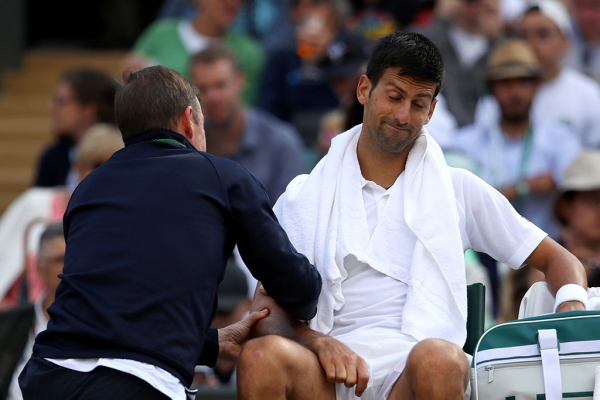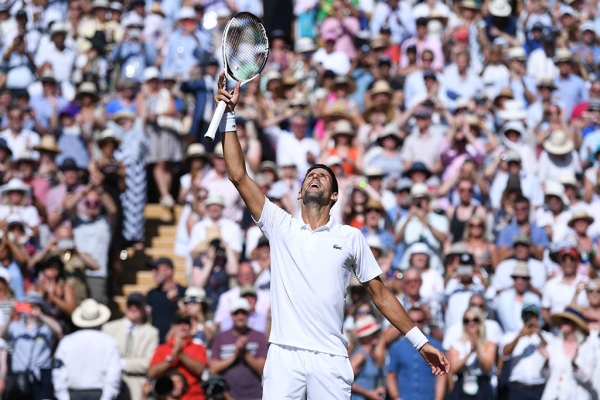Plotted on a graph, Novak Djokovic’s performance from 2016 to 2018 represents one of the sharpest “U” shapes in modern tennis history.
In June 2016 he held all four Grand Slam titles. A year later, elbow problems forced him off the tour for six months and outside the top 20. He then rebounded to win Wimbledon in 2018 – and later came within two wins of holding all four major titles simultaneously, again.
“I was frustrated and questioning whether I can get back [to the] desired level or not. But that makes this whole journey even more special for me,” Djokovic said following Wimbledon 2018.
“I really am grateful to go through … mixed emotions, turbulences as well mentally, moments of doubt and disappointment and frustration, anger.
“You get to have an opportunity to rise like a phoenix and evolve and get better.”
This “turbulence” became apparent in early 2017, when he was stunned in the Australian Open second round by Denis Istomin, then crushed 7-6(5) 6-3 6-0 in the French Open quarterfinals by Dominic Thiem.
When he retired after losing the first set to Tomas Berdych in the Wimbledon quarters, it emerged he was carrying an elbow injury.

“That already keeps bothering (me) for over a year and a half actually,” admitted Djokovic, who promptly shut down his season to heal the injury.
Yet the turbulence also infiltrated his entourage.
Prior to the French Open, Djokovic split with three long-serving team members; coach Marian Vajda, trainer Gebhard Phil Gritsch and physiotherapist Miljan Amanovic.
“My biggest goal is to find the winning spark on the court again,” Djokovic reasoned.
Into the fold came Andre Agassi, and, later in 2017, Radek Stepanek.
Yet this change-up failed to spark much winning – when Djokovic resumed in January after six months on the sidelines, he did not win a title in the first half of 2018.
He reunited with Vajda toward the end of that time.
Frustration boiled over at Roland Garros after an unexpected loss to world No.72 Marco Cecchinato in the quarterfinals. “I don't know if I'm going to play on grass,” Djokovic said.
“I don't know what I'm going to do. I just came from the court. Sorry, guys, I can't give you that answer. I cannot give you any answer.”
Djokovic went off grid, mountain-hiking for five days with wife Jelena. When he returned to sea level, he decided he would play on grass, and reached the final at Queen’s Club.
He arrived at the All England Club ranked No.21 – and lost just one match in the next four months.

Djokovic overwhelmed Kevin Anderson to become the lowest-ranked men’s champion at Wimbledon in 17 years, then went on to win the Cincinnati Masters, the US Open – winning his last five matches in straight sets – and the Shanghai Masters to end the season at world No.1.
There was no slowing down as 2019 commenced.
At the Australian Open, Djokovic delivered Nadal his heaviest ever loss in a Grand Slam final, committing just nine unforced errors in the 6-3 6-2 6-3 win.
Mats Wilander declared the performance “absolute perfection”, while Pat Cash deemed it “mind-blowing tennis”.
“It was truly a perfect match,” agreed the Serb. “Twelve months ago it was highly unlikely I would be holding three Slams. I just have to be conscious of that and understand that I'm blessed.”
Djokovic later advanced to the Roland Garros semifinals, where Thiem pipped him in five sets to prevent an incredible second sweep of all four major titles.
Yet he rebounded immediately to win Wimbledon 2019, and his 17th major singles title at Australian Open 2020, avenging his loss to Thiem with a thrilling five-set win over the Austrian in the final.
That AO 2020 triumph set the stage for another phenomenal season; the Serb has won four singles titles, and by reaching the Roland Garros final in October, improved his win-loss record to 37-2.
Should he win the ATP title in Vienna, Djokovic will equal Pete Sampras' record of six seasons as the year-end world No.1.